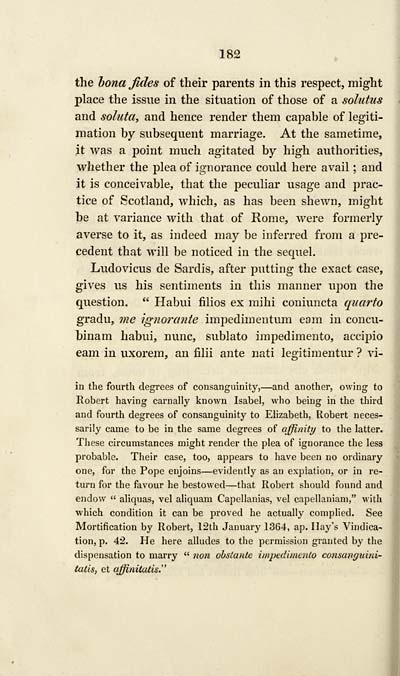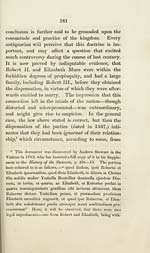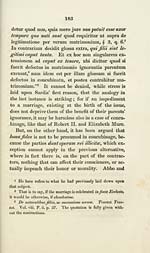Tracts, legal and historical
(198) Page 182
Download files
Complete book:
Individual page:
Thumbnail gallery: Grid view | List view

182
the bona fides of their parents in this respect, might
place the issue in the situation of those of a solutus
and sohita, and hence render them capable of legiti-
mation by subsequent marriage. At the sametime,
it was a point much agitated by high authorities,
whether the plea of ignorance could here avail ; and
it is conceivable, that the peculiar usage and prac-
tice of Scotland, which, as has been shewn, might
be at variance with that of Rome, were formerly
averse to it, as indeed may be inferred from a pre-
cedent that will be noticed in the sequel.
Ludovicus de Sardis, after putting the exact case,
gives us his sentiments in this manner upon the
question. " Habui filios ex mihi coniuncta quarto
gradu, me ignorante impedimentum earn in concu-
binam habui, nunc, sublato impedimento, accipio
earn in uxorem, an filii ante nati legitimentur ? vi-
in the fourth degrees of consanguinity, — and another, owing to
Robert having carnally known Isabel, who being in the third
and fourth degrees of consanguinity to Elizabeth, Robert neces-
sarily came to be in the same degrees of affinity to the latter.
These circumstances might render the plea of ignorance the less
probable. Their case, too, appears to have been no ordinary
one, for the Pope enjoins — evidently as an expiation, or in re-
turn for the favour he bestowed — that Robert should found and
endow " aliquas, vel aliquam Capellanias, vel capellaniam," with
which condition it can be proved he actually complied. See
Mortification by Robert, 12th January 1364, ap. Hay's Vindica-
tion, p. 42. He here alludes to the permission granted by the
dispensation to marry " non obstante impedimento consanguini-
tatis, et qffinitatis."
the bona fides of their parents in this respect, might
place the issue in the situation of those of a solutus
and sohita, and hence render them capable of legiti-
mation by subsequent marriage. At the sametime,
it was a point much agitated by high authorities,
whether the plea of ignorance could here avail ; and
it is conceivable, that the peculiar usage and prac-
tice of Scotland, which, as has been shewn, might
be at variance with that of Rome, were formerly
averse to it, as indeed may be inferred from a pre-
cedent that will be noticed in the sequel.
Ludovicus de Sardis, after putting the exact case,
gives us his sentiments in this manner upon the
question. " Habui filios ex mihi coniuncta quarto
gradu, me ignorante impedimentum earn in concu-
binam habui, nunc, sublato impedimento, accipio
earn in uxorem, an filii ante nati legitimentur ? vi-
in the fourth degrees of consanguinity, — and another, owing to
Robert having carnally known Isabel, who being in the third
and fourth degrees of consanguinity to Elizabeth, Robert neces-
sarily came to be in the same degrees of affinity to the latter.
These circumstances might render the plea of ignorance the less
probable. Their case, too, appears to have been no ordinary
one, for the Pope enjoins — evidently as an expiation, or in re-
turn for the favour he bestowed — that Robert should found and
endow " aliquas, vel aliquam Capellanias, vel capellaniam," with
which condition it can be proved he actually complied. See
Mortification by Robert, 12th January 1364, ap. Hay's Vindica-
tion, p. 42. He here alludes to the permission granted by the
dispensation to marry " non obstante impedimento consanguini-
tatis, et qffinitatis."
Set display mode to:
![]() Universal Viewer |
Universal Viewer | ![]() Mirador |
Large image | Transcription
Mirador |
Large image | Transcription
Images and transcriptions on this page, including medium image downloads, may be used under the Creative Commons Attribution 4.0 International Licence unless otherwise stated. ![]()
| Histories of Scottish families > Tracts, legal and historical > (198) Page 182 |
|---|
| Permanent URL | https://digital.nls.uk/95036382 |
|---|
| Description | A selection of almost 400 printed items relating to the history of Scottish families, mostly dating from the 19th and early 20th centuries. Includes memoirs, genealogies and clan histories, with a few produced by emigrant families. The earliest family history goes back to AD 916. |
|---|

